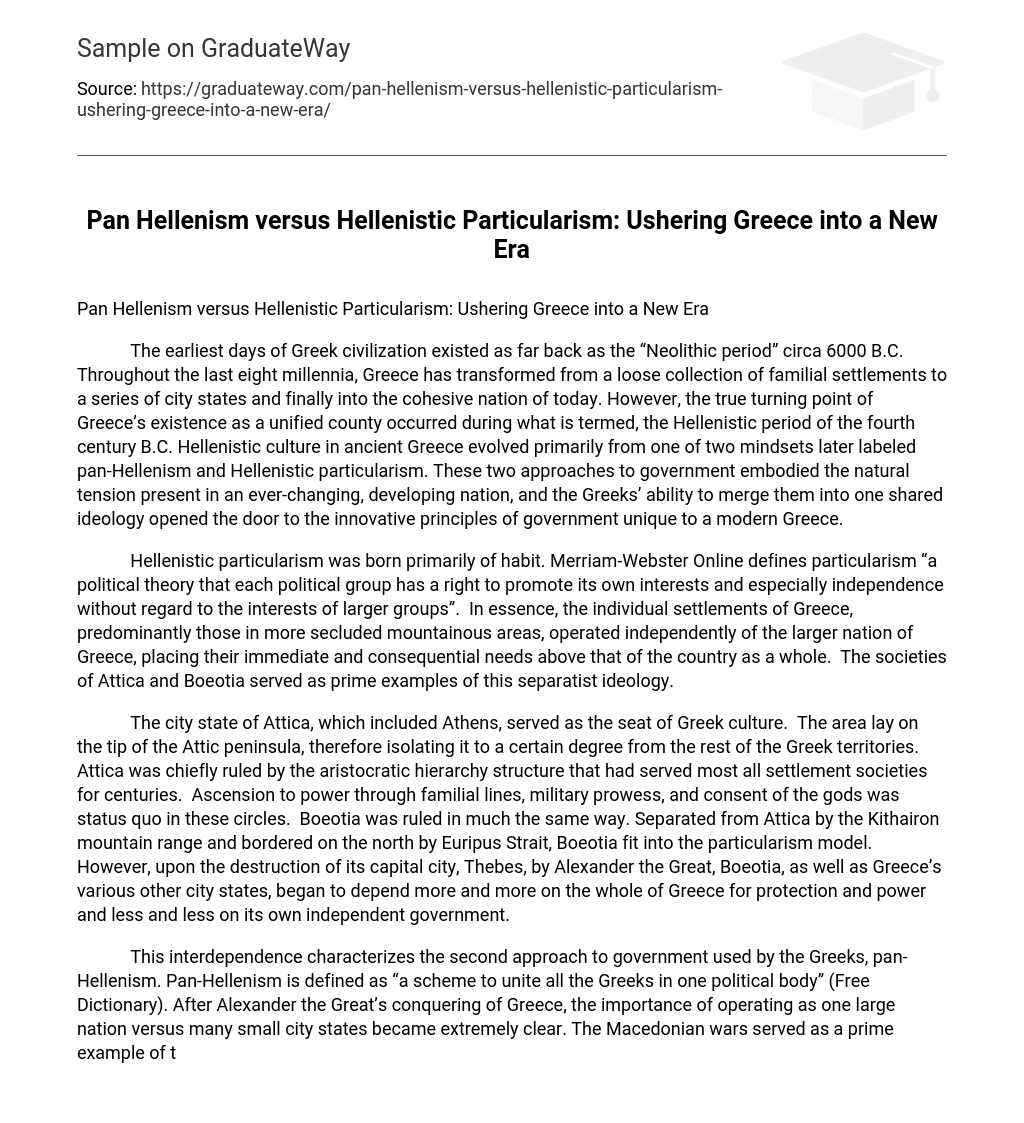The earliest days of Greek civilization existed as far back as the “Neolithic period” circa 6000 B.C. Throughout the last eight millennia, Greece has transformed from a loose collection of familial settlements to a series of city states and finally into the cohesive nation of today. However, the true turning point of Greece’s existence as a unified county occurred during what is termed, the Hellenistic period of the fourth century B.C. Hellenistic culture in ancient Greece evolved primarily from one of two mindsets later labeled pan-Hellenism and Hellenistic particularism. These two approaches to government embodied the natural tension present in an ever-changing, developing nation, and the Greeks’ ability to merge them into one shared ideology opened the door to the innovative principles of government unique to a modern Greece.
Hellenistic particularism was born primarily of habit. Merriam-Webster Online defines particularism “a political theory that each political group has a right to promote its own interests and especially independence without regard to the interests of larger groups”. In essence, the individual settlements of Greece, predominantly those in more secluded mountainous areas, operated independently of the larger nation of Greece, placing their immediate and consequential needs above that of the country as a whole. The societies of Attica and Boeotia served as prime examples of this separatist ideology.
The city state of Attica, which included Athens, served as the seat of Greek culture. The area lay on the tip of the Attic peninsula, therefore isolating it to a certain degree from the rest of the Greek territories. Attica was chiefly ruled by the aristocratic hierarchy structure that had served most all settlement societies for centuries. Ascension to power through familial lines, military prowess, and consent of the gods was status quo in these circles. Boeotia was ruled in much the same way. Separated from Attica by the Kithairon mountain range and bordered on the north by Euripus Strait, Boeotia fit into the particularism model. However, upon the destruction of its capital city, Thebes, by Alexander the Great, Boeotia, as well as Greece’s various other city states, began to depend more and more on the whole of Greece for protection and power and less and less on its own independent government.
This interdependence characterizes the second approach to government used by the Greeks, pan-Hellenism. Pan-Hellenism is defined as “a scheme to unite all the Greeks in one political body” (Free Dictionary). After Alexander the Great’s conquering of Greece, the importance of operating as one large nation versus many small city states became extremely clear. The Macedonian wars served as a prime example of the benefits of a pan-Hellenistic culture. Scholars attribute the fall of many of the city states during the wars to Greece’s as yet unrelenting adherence to particularism. “[T]he resistance of the Greek polis to political unification with other Greek city states were considerably already in antiquity to be the cause of the collapse of the Greek political system” (Perlman 3). A larger dominant military power had a greater chance of defending its homeland against invaders.
Pan-Hellenistic culture was propagated by the community-bonding festivals at Olympia and Nemea for example. The modern day Olympics is based on these original sporting events between the then city states of Greece. The fourth century B.C. Greek historian Ephoros purportedly began using the term “Olympiads” to count the time in between the Olympic Games. Before this time the different city states used varying methods to calculate time. This new system enabled further union of the disconnected city states.
The pan-Hellenistic movement eventually drew Greece together into one unified nation more able to adequately defend itself against aggressors as well as provide a more comprehensive form of government for its people. The city state gave way to uniformity and national custom. The spirit of particularism and independence between city states did not disappear from Greek life altogether, but the advantages of a pan-Hellenistic Greece far outweighed the partisan relationships detrimental to any society.
WORKS CITED
Perlman, S. “Panhellenism, the Polis, and Imperialism.” Historia: Zeitschrift für Alte Geschichte 25.1 (1976) 2 pars. 22 October 2008
http://www.jstor.org.lib-proxy.fullerton.edu/stable/4435482 ?seq=30&Search=yes&term=panhellenism&list=hide&searchUri=%2Faction%2FdoBasicSearch%3FQuery%3Dpanhellenism%26wc%3Don&item=2&ttl=299&returnArticleService=showArticle&resultsServiceName=doBasicResultsFromArticle.htm
Merriam-Webster Online Dictionary. 2008. Merriam-Webster Online. 22 October 2008
http://www.merriam-webster.com/dictionary/particularism
The Free Dictionary. 2008. Farlex. 22 October 2008
http://www.thefreedictionary.com/panhellenism





